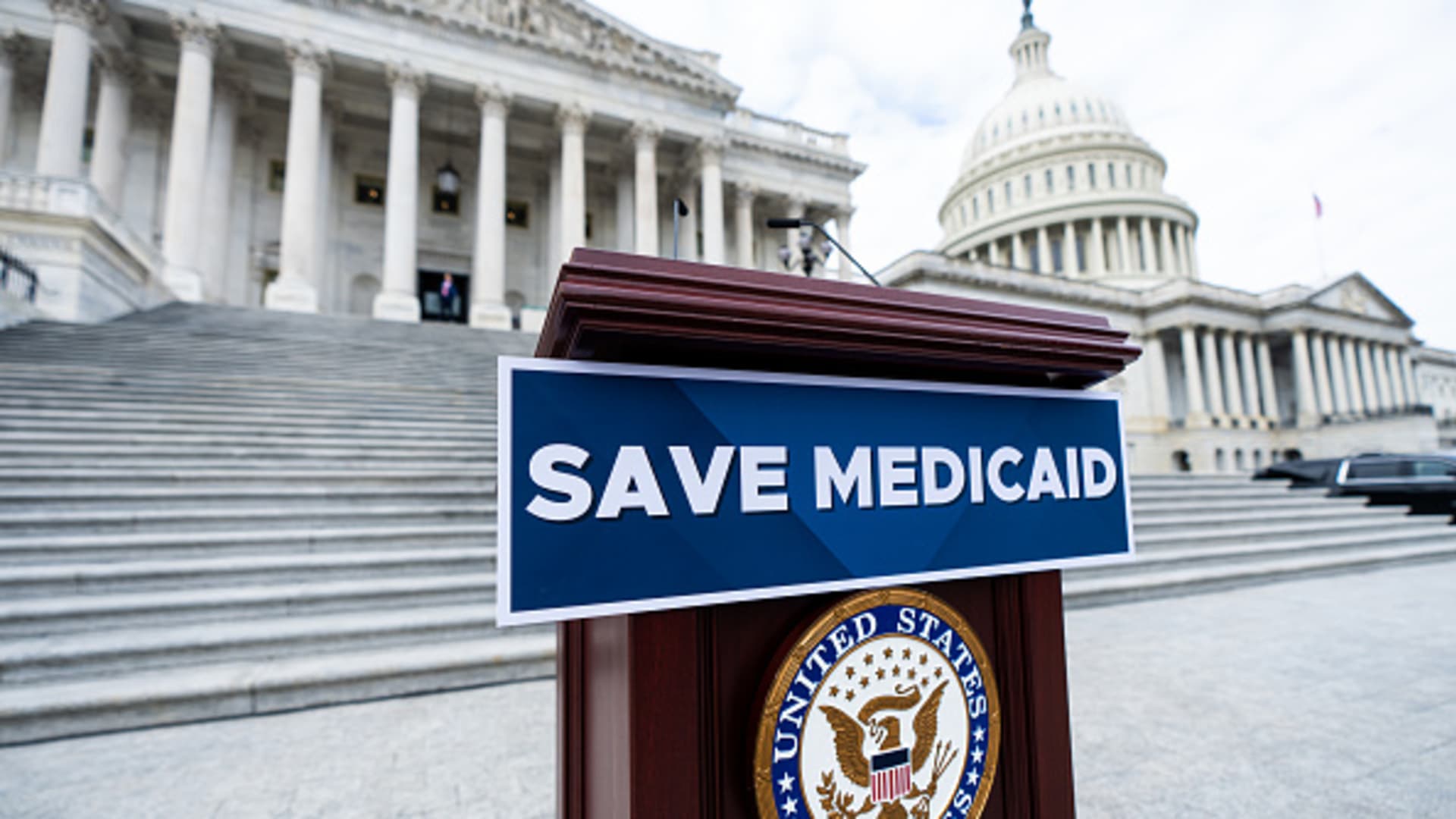A “Save Medicaid” sign is affixed to the podium for the House Democrats’ press event to oppose the Republicans’ budget on the House steps of the Capitol on Tuesday, February 25, 2024.
Bill Clark | Cq-roll Call, Inc. | Getty Images
The multitrillion-dollar tax and spending package passed by the House of Representatives on Thursday includes historic spending cuts to Medicaid health coverage and the Supplemental Nutrition Assistance Program, or SNAP.
Now, it is up to the Senate to consider the changes — and to perhaps propose its own.
As it stands, the legislation — called the “One Big Beautiful Bill Act” — would slash Medicaid spending by roughly $700 billion and SNAP, formerly known as food stamps, by about $300 billion.
“Bottom line is, a lot of people will lose benefits, including people who are entitled to these benefits and who are not the target population of this bill,” said Jennifer Wagner, director of Medicaid eligibility enrollment at the Center on Budget and Policy Priorities.
More from Personal Finance:
How the House Republican tax bill favors the rich
Tax bill includes $1,000 baby bonus in ‘Trump Accounts’
Food stamps face ‘biggest cut in the program’s history’
The cuts to Medicaid and SNAP — the largest in the programs’ histories — come as the reconciliation bill would add roughly $3 trillion to the nation’s debt including interest over the next decade, estimates the Committee for a Responsible Federal Budget.
To help pay for a variety of tax perks included in the bill, House Republicans have targeted Medicaid and SNAP for savings.
“We don’t want any waste, fraud or abuse,” President Donald Trump said Tuesday on Newsmax when asked about prospective Medicaid changes. “Other than that, we’re leaving it.”
Likewise, some Republican leaders have pointed to rooting out abuse of SNAP benefits.
One way House Republicans are seeking to curb the programs’ spending is through new work requirements.
New Medicaid work requirements to get earlier date
Under the House proposal, new Medicaid work requirements will apply to people who are covered through the Affordable Care Act expansion. To be eligible, those individuals will need to participate in qualifying activities for at least 80 hours per month unless they can prove they have an approved exemption, according to Jennifer Tolbert, deputy director of KFF’s Program on Medicaid and the Uninsured.
In last-minute negotiations, House Republicans moved the date for implementing those work requirements to no later than Dec. 31, 2026, up from a previously proposed effective date of Jan. 1, 2029 — around two years earlier than the original version, CBPP’s Wagner noted.
Notably, it also gives states permission to start implementing the work requirements earlier than that date.
“On the Medicaid side, the work requirement is arguably the harshest provision,” Wagner said. “It will lead to the greatest cuts of enrollment in Medicaid.”
The new accelerated timeline also doesn’t allow time for rulemaking, a process by which the public can submit comments, and the Centers for Medicare and Medicaid Services may respond to those submissions, Wagner noted. Instead, the legislative proposal calls for guidance to be issued by the end of 2025, which she said is a “big deal” because it eliminates the opportunity for adjustments to be made in response to public comments.
Moving up the effective date also limits the ability to conduct public outreach to notify individuals of the coming changes, said Tolbert of KFF. States will also have less time to adjust their systems to track whether individuals are working the required number of hours or engaging in other necessary activities, she said.
Within the work requirements, the House also moved to limit the discretion to determine other medical conditions that may make someone exempt that had been in the original version, Wagner said.
Notably, the proposal also calls for states to conduct more frequent eligibility redeterminations for adults who are eligible for Medicaid through Affordable Care Act expansions. Starting Dec. 31, 2026, states will be required to conduct redeterminations every six months, compared to current requirements that require eligibility reviews within 12 months of changes in a beneficiary’s circumstances, according to KFF.
The increased frequency of the redeterminations are “likely to have a big impact,” Tolbert said.
Ultimately, the work requirements may make it difficult for people to access the health coverage they need, she said.
“What this may end up doing is having the opposite of the intended effect,” Tolbert said. “They may lose access to the very treatments and services that are enabling them to work.”
SNAP work requirements would be expanded
Under the House Republican bill, work requirements would also be expanded for SNAP benefits.
Individuals ages 18 to 54 who have no dependents and are able to work are already face SNAP benefit limitations based on 80-hour per month work requirements.
The proposal would extend those requirements to individuals ages 55 to 64, as well as households with children, unless they are under age seven. In addition, states would also be limited in the flexibility they may provide with waivers of the work requirements or discretionary exemptions, according to the Urban Institute.
In addition, federal funding cuts would make it so states would have to contribute more toward benefits and administration of the program.
Ultimately, those changes could take away food assistance for millions, according to the Center on Budget and Policy Priorities.


 Economics1 week ago
Economics1 week ago
 Economics1 week ago
Economics1 week ago
 Economics1 week ago
Economics1 week ago
 Economics1 week ago
Economics1 week ago
 Blog Post1 week ago
Blog Post1 week ago
 Economics1 week ago
Economics1 week ago
 Economics6 days ago
Economics6 days ago
 Economics1 week ago
Economics1 week ago














